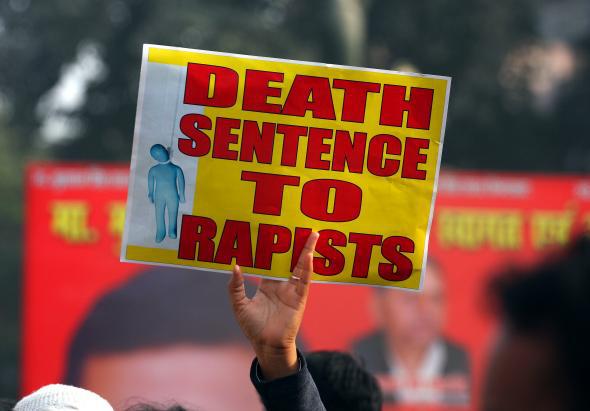An Indian court today sentenced three men to death for the horrific gang rape of a photojournalist in Mumbai last year. They are the first to be sentenced under India’s tough new anti-rape law.
The sentence hammers home something that’s been obvious for some time now: After appearing to be on the verge of abolishing the death penalty entirely, India has now firmly rejoined the ranks of the world’s executioners. It’s one of a number of countries—including some of the world’s largest democracies—that have recently re-embraced capital punishment.
A 1983 Indian Supreme Court decision allows for capital punishment in only the “rarest of the rare” cases, and from 2004 to 2011 the country didn’t carry out any executions at all. From 1995 to 2012, it carried out only three.
Then in 2012, Ajmal Kasab, the last surviving gunman of the 2008 Mumbai terror attack, was hanged in secret in what appeared to be an unusually swift and haphazard execution.* The Kashmiri militant Afzal Guru was hanged under similar circumstances last year. Seventy-two people in total were sentenced to die in India last year, including four of the men involved in the gang rape and murder of a 23-year-old medical student in Delhi in 2012—a case that shocked the country and prompted the drafting of laws aimed at speeding up the prosecution of rapists.
India’s not the only country heading in this direction. Amnesty International’s 2013 death penalty report noted that executions were up 15 percent last year—and that’s not even counting China, where the number of executions is a state secret. Just three countries—Iran, Iraq, and Saudi Arabia—accounted for 80 percent of executions, but to my mind, the most interesting recent trend has been been the countries that, like India, have been bucking the general global movement away from the death penalty.
In 2012 Japan carried out its first executions since 2010. Under Prime Minister Shinzo Abe, four rounds of “secret executions” have taken place.
Nigeria carried out its first executions in seven years last year and Indonesia its first in five years. Vietnam resumed them after an 18-month pause with the execution of seven people by lethal injection.
It’s true that in terms of number of countries, the world is moving away from the death penalty. According to Amnesty’s numbers, 37 countries had the death penalty in 1994, compared with 22 today. In Europe and Latin America, the practice has essentially been entirely banished and an increasing number of African countries are reviewing their laws.
On the other hand, with the exception of Brazil, where it’s banned, and Russia, where it’s legal but abolished in practice, the world’s 10 biggest countries are all death penalty states. With India, Japan, and Indonesia rejoining the U.S., the world’s largest democracies are death penalty countries and the practice has heavy popular support in all of them.
The U.S. still executes a lot more people than any non-dictatorship and many dictatorships—39 in 2013—though that number as well as public support for the death penalty are falling, amid concerns over the fairness of prosecutions as well as more mundane concerns like a shortage of the drugs needed for lethal injection.
Interestingly, Americans seem to be reconsidering the death penalty at the same time that the country is looking like less of a global outlier.
*Correction, April 4, 2014: This post originally misspelled Mumbai shooter Ajmal Kasab’s first name.
